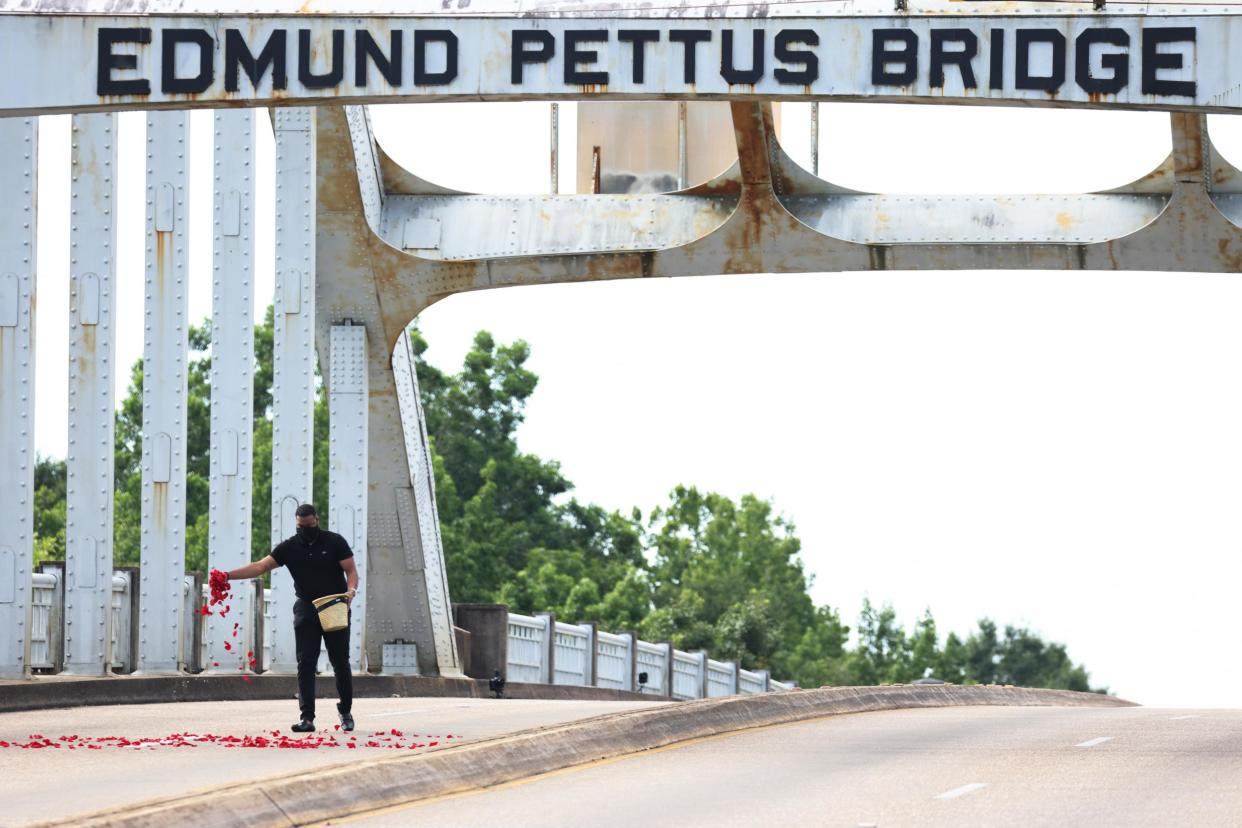John Lewis: Body of civil rights leader carried across Selma bridge on his final journey

More than 50 years after police attacked demonstrators marching across the Edmund Pettus Bridge in Selma, Alabama in a turning point for voting rights, the body of John Lewis – a giant of the civil rights movement and a 30-year member of Congress – has crossed the bridge a final time.
He died on 17 July after a pancreatic cancer diagnosis. He was 80 years old.
Military service members carried his casket, draped in an American flag, into a horse-drawn carriage leading a procession from Brown Chapel AME Church on Sunday, part of a week-long series of memorials and funeral services honouring the
Rose petals were spread across the bridge as mourners awaited his arrival.
Mr Lewis – who served Georgia in the House of Representatives since 1987 – was among dozens of demonstrators as part of a march from Montgomery to Selma, when a line of Alabama State Troopers had blocked their path, declared by then-Governor George Wallace as an illegal demonstration.
Then 25 years old, Mr Lewis was bludgeoned by police who hit him with clubs, fracturing his skull, in what became the movement's "Bloody Sunday" on 7 March 1965. Dozens of others were injured, including Amelia Boynton, who was left unconscious. Horrific images spread by the media and outrage that followed helped spur the passage of the Voting Rights Act to prevent racial discrimination at the polls.
He was arrested at least 45 times throughout his career, risking his life supporting voting rights and the enfranchisement of black Americans in the face of violent suppression.
Mr Lewis also joined freedom riders on interstate bus rides through the segregated south following a US Supreme Court ruling that determined segregated buses unconstitutional, and he was the youngest speaker at the Lincoln Memorial during the 1963 March on Washington. He was 23 years old.
"We're tired of being beaten by policeman," he said in his emotional address at the Lincoln Memorial. "We're tired of seeing our people locked up in jail over and over again ... We want our freedom and we want it now."
Mr Lewis would visit Selma and march across the bridge, while linked arm in arm among hundreds of others, in the years that followed, echoing his calls for the full protection of voting rights in the face of systemic oppression he made decades earlier in a definitive moment for the nation.
"I thought I saw death," he said in 2016, remembering his near-fatal beating 50 years earlier. "I thought I was going to die. Today, thousands of Americans are still being denied the right to vote, and the protections granted by the Voting Rights Act of 1965 are being eroded. We can do better and we must do better. We must honour the sacrifices of all those who marched, sacrificed, bled, and died, by restoring the Voting Rights Act and guaranteeing that no person is denied their right to vote."
His son John-Miles Lewis, along with his brothers Freddie Lewis, Sam Lewis, Grant Lewis and sister Rosa Tyner, along with his chief of staff Michael Collins, joined the process.
Mr Lewis' body will lie in state at the Alabama State Capitol in Montgomery.
His body will also lie in state in Washington DC at the US Capitol.
Services were also held in Troy, Alabama, where he was born, and Ebenezer Baptist Church in Atlanta, where Martin Luther King Jr had preached.
Mr Lewis' death has renewed calls to rename the bridge, named after a Confederate general and member of the Ku Klux Klan.
Voting rights proponents also have demanded that Congress renew the Voting Rights Act – from which the US Supreme Court had gutted vital components in 2013 – and rename the landmark legislation after Mr Lewis.
While Republicans argue that black voters do not face barriers to voting, Democrats have said that while over discrimination – including poll taxes and literacy tests – have been eliminated, there remain significant obstacles, including the closures of hundreds of polls that have limited access to voting booths, permitted by the Supreme Court's decision.
But last year, House Democrats voted to reinstate federal oversight over election laws, but the Republican-controlled Senate at the lead of Senate Majority Leader Mitch McConnell has blocked the legislation.
Read more
John R Lewis: Civil rights leader who championed racial justice
Former presidents and pay tribute to civil rights giant John Lewis
John Lewis, civil rights icon and longtime congressman, dies

